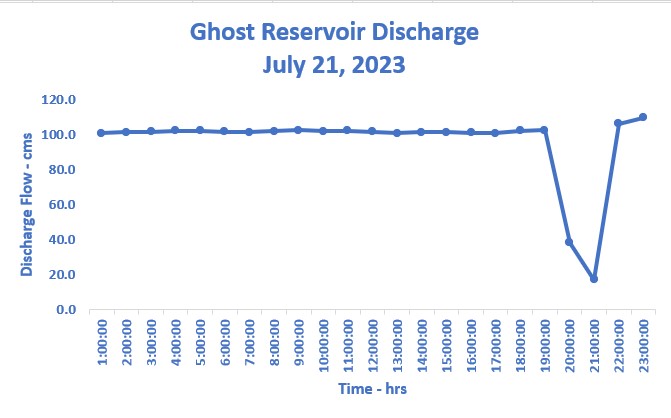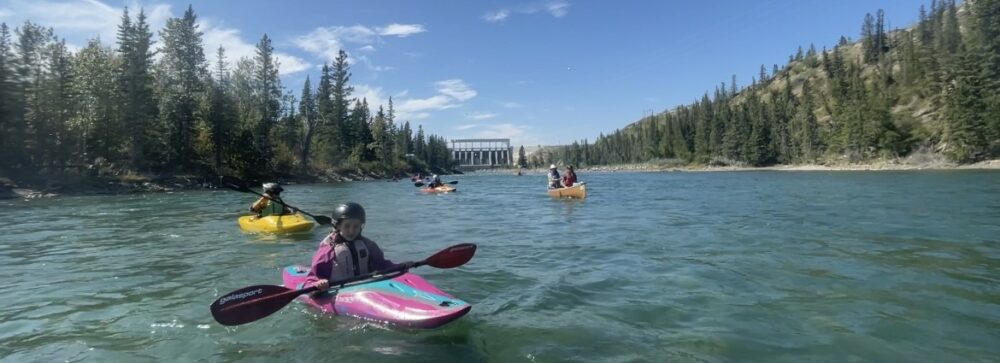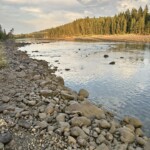Is the Bow River a safe place for recreational activities? Generally, the answer is yes, but on July 21, 2023, a failure of the Ghost Hydroelectric Plant may change your mind!
The power plant was knocked offline by a lightning strike, and water flowing through the turbines dropped to almost zero. When the power was restored to the plant two hours later, river flows were immediately increased to previous levels. A wall of water over a meter in height shot down the river. Paddlers who were on the river at the time of the event were stranded by the low flows and were confronted with eminent danger when the power plant went back online. CRUA was not aware of the catastrophic event for a month, at which time we reached out to the paddling community for additional information:
Comments: I was on the river that day. It was devastating to see it this way. Any people near the water, especially kids playing could have easily been swept away and worse when they opened the dam. I was at the edge and 20 seconds later the river was blown out and turbid worse than run-off. Boaters were stranded and when they opened the dam were swept away. I hope no one was hurt. A picture of after they opened the dam in a slow-moving section that never gets this high.
CRUA opened up engagement with Transalta, the Ghost Power Plant operator and Alberta Environment & Protected Areas for some explanation of what happened, the remedial action that was planned and why CRUA as a stakeholder in river recreation activities was not informed. It has taken two months to get all the information together in the report of the events. Our findings are stunning!
What is clear from our engagement on this event is that Transalta is not restricted in the quantity, and speed of water released from the reservoir. The only caveat under the Ghost Reservoir and Power Plant federal water license dates back to 1929, is to provide clean drinking to downstream communities.
The Alberta Government does not have any oversight legislation under the Alberta Water Act to intervene in Transalta’s water management practices in the interest of protecting the fishery, and human safety. But rather concede to the historical Ghost Reservoir license from 1929 that was enshrined into the Alberta Water Act as having precedence over the act itself.
With apparently no plans for an upgrade in public safety procedures by Transalta, and no oversight by the Government of Alberta, and a similar event was to take place below the Bearspaw Reservoir in the summer months a very large number of recreational floaters and anglers would be at risk.
The Report’s Abstract:
The Bow River water management policy consists of a working relationship between all primary water users and the Government of Alberta (GoA). Upstream of Calgary, Transalta has control over all reservoir capacity and water flows out of their hydroelectric power plants. The City of Calgary and the irrigation districts downstream have water allocation rights within federal water licenses and the GoA. Water is released or held back within the Bow River Basin reservoirs to meet projected demand.
The Ghost Hydroelectric Power Plant is one of several Bow River power plants employing a practice referred to as “hydropeaking” that allows Transalta to ramp up water discharge from the reservoir to increase electrical power supply during high seasonal and daily demands. The Bearspaw Reservoir downstream acts as a cushion from the hydropeaking effects and stabilizes water flows within and downstream of Calgary giving rise to safe and expanding river recreation opportunities.
On July 21, 2023, the Transalta Ghost Reservoir Hydroelectric Power Plant received a lightning strike knocking out the operation of the power plant and flows through the turbines stopped. When the operating system was corrected two hours later, an immediate discharge of 110 cms of water resumed putting paddlers at risk when a wall of water over one meter in height went down the river.
An event of this nature should fit into a protocol where federal and provincial authorities are immediately informed, and the remedial action that the holder of the license will take to improve safety, protect the ecology of the river, and improve safety. Both Transalta, the power plant operator, and Alberta Environment & Protected Areas were contacted for comment on the event. CRUA was hoping for guidelines that would alleviate a similar situation happening again.
Transalta Response: “…We share your concern about what might have happened, and we appreciate your efforts to engage us about it”. And “…TransAlta understands its responsibilities as a hydro operator on the Bow River system and takes these responsibilities extremely seriously. Despite our efforts to manage the safety of our operations, we also appreciate that maintaining public safety where we operate is a shared responsibility”.
Alberta Environment & Protected Area Response: “…TransAlta holds an Environment and Protected Areas (EPA) water license for the reservoir, and they are expected to follow the terms and conditions within that license. TransAlta’s water license at the Ghost Reservoir has no conditions that require TransAlta to report or notify the Government of Alberta prior to any events.




